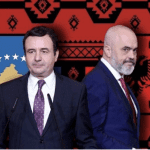By Albert Rakipi
There are at least two reasons which require a serious reassessment of the EU perspective as it is understood from the Western Balkans and from Brussels. First, with the final status of Kosova process coming to an end, it is the time to move from a security agenda to a development one. In this context only a clear status of Kosova from a legal and practical perspective will help create the environment where potential security problems will derive not from ethnic issues but from the region’s economic problematique.
The second reason is related to the need for a strategic role of EU in the region. From this perspective as the Amato Commission warned almost one year ago, the real referendum on the EU’s future will take place in the Balkans. Practically in the Western Balkans or “little Balkans” since after Bulgaria’s and Romania’s EU membership it looks like a small island surrounded by EU countries which, in foreign policy, may well make or break the Union’s outward ambitions.
My second consideration is about the Italian initiative and Italy’s role to reopen the debate on EU perspective in the Balkans in a time when the Union itself is involved in a process of deep reflection on constitutional and other derivatives of the deepening process of integration. In this context, Italy’s role is crucially important not simply because Italy is the EU front line state with our region. This is just one part of the story. As one of the key players of EU, Italy has strategic capacities to play an important role in the Balkans.
Another new element in Italy’s and EU rethinking and commitments in the Balkans is the real fact that the motives need no longer be the spillover effects of Balkans instability. For a relatively long time, the European Union and especially the EU front line states like Italy have been motivated to intervene to a certain extent for security reasons that have been related to organized crime, forced migration and alike.
I don’t mean that the Balkans is free of such threats but parallel with the negative reasons that have motivated the outside assistance and intervention, now there are positive reasons for outside commitment to the region. Opportunities for Italy and the EU itself are slowly materializing in the Balkans.
Now let me to come to my contribution to the issue of European perspective as seen from the Balkans through three dimensions
First: What is European Union in terms of perceptions and expectations?
Second: How is the issue of local ownership understood both by the elites and societies in our region?
Third: How is the EU membership perspective serving as a driving force behind the state building process in the Balkans? Actually I will bring evidence mostly from Albania but nevertheless I think that a number of issues to a certain point might be relevant for other countries too.
EU Strategically the most
important actor
The European Union is considered to be the most important strategic actor in Albania. According to the latest study of Albanian Institute for International Studies the EU occupies the first place among ten countries or international institutions.
Albania signed the SAA on June last year making a new qualitative step in its relations with the European Union. The road to signing this agreement was relatively long – it took almost three years and half- compared to other countries in the region. And the reason has little to do with the technical conduct of negotiations. Instead, Albania needed to demonstrate that the political process and institutions were functioning more or less properly or at least differently from the previous years. Nevertheless this agreement remains the most important one the post communist country has signed so far.
Actually the European Union is much more present and more visible for the hole society. The level of support for EU membership is also exceptional in Albania. According to the same study more than 92 percent of Albanians would support EU membership in the case of potential referendum. And this level of support has been consistent during the last six years.
There is no doubt that this level of support is a good thing and should be exploited by the political elite and other relevant institutions in the country in order to undertake the necessary reforms in the political and economic realms. A more careful analysis of such popular support for EU membership in a poor country like Albania shows exactly the integration stage and the structure of Albanian economy. The real test will be the SAA which will affect – at least initially- negatively the Albanian national economy. Given Albania’s experience with bilateral Free Trade agreements with other Balkan countries, the capacity of Albanian economy to operate and survive in a larger and more competitive market is low. Nevertheless, it is clear that there is no other development alternative for South East European countries.
The issue of local ownership
Considering the European Union as strategically the most important actor and having popular support for EU membership is just the nice part of the story.
Another perspective that needs to be analyzed is the issue of local ownership of EU Integration process. The real question is the commitment and the capacity of local elites to reclaim ownership of the process. This in fact represents the proper approach and at the same time the essential challenge. I will bring few details in order to illustrate that the EU agenda is simply considered as a Brussels agenda and not as a national program to develop the economy and to strengthen state capacities.
In Albania there are grave misperceptions regarding the European Integration process. Many perceive it as a miracle that will come from Brussels and not as something that can be achieved through internal reforms that will resulted in a consolidated democracy with a functioning market economy. For example the majority of Albanians that would vote for EU membership believe that the EU membership will improve their living standards.
Despite a higher level of knowledge and understanding of the European integration process further misperceptions continue to prevail. So a substantial part of Albanian society – about 40 percent think that Brussels should accept Albania before it is ready for EU membership. The third misperception is related to the expectations that Albanians have from a potential EU membership. According to surveys carried out during the last six years, free movement is perceived as the most important benefit of EU membership
EU Membership – A driving force to state – building
process
If we look at today’s Balkans from the state capacity perspective it is not difficult to realize that the state is weak in terms of its ability to provide for its citizens public goods like, security, a functioning legal system, a certain standards of educations, health care, infrastructure, roads, communications or other basic services that a state is supposed to provide.
The state in the Balkans is weak for complex reasons: the state tradition which does not go very far, the very low level of industrialization and economic development, the agrarian structures of national economies., the nature of the previous regime and economy including the conflicts and wars of the last decade just to mention a few of them. With such a historical background it is no wonder that the state building process is still under way in our region.
The state building process is one of the most important issues facing the world community because it presents the modern threat to national, regional and international security. The state building process actually is the core of the International Institutions / Organizations including EU.
During the last decade and especially after the end of the Kosovo war, the prospect of EU membership for the weak Balkan countries has been e real driving force of state building process. Compared to other major hotspots in the world map, the Balkans is one of the regions where state building has a realistic chance to succeed in the short-term through a unique combination of internal and external factors. Primary among these is the presence of the European Union offering perspectives, guarantees and aid that virtuously feeds into the state-building cycle.
Analyzing the dynamic of EU intervention in the Balkans after the first crisis of 1991 it is notable that the increasing role of EU actually concentrated on the core of the security problem in today’s Balkans: the weak state. In order to overcome state weakness the European Union – and other players too – are involved in day to day state-building process in countries like Albania Macedonia and other Balkan countries by promising them EU membership. The local elites are under the pressures to undertake the required reforms in order to meet EU criteria. Further the EU conditionality serves as a basis for domestic legitimacy of the government in Balkan states. Failing to meet EU conditions means otherwise losing government legitimacy which is an essential feature of weak states.
In Albania the scale of foreign and especially EU intervention in internal politics has been relatively higher than in other countries but that is because local elites see politics as a zero sum game which sometimes undermines the minimal consensus necessary for democracy .
Another crucial aspect of EU state building dimension in the Balkans is related to state capacities . In Albania for example the EU is building or reorganizing state institutions such as police force, custom services , infrastructure like roads communication etc.
For the arguments mentioned above keeping alive the EU perspective is crucially important for the future of the region.
The latest stage of affairs in the region suggests the need for a change in EU approach towards the region. A change in a positive direction would be to see the region not only as a threat but as an opportunity as well.
Further in the last four or five years the EU or some of its member states including Italy have identified organized crime as a main security threat emanating from the Balkans. This is only partly true. The fact is that organized crime is not a security threat per se. The organized crime and other similar phenomena are simply the symptoms of state weakness in the Balkans including Albania. Consequently the proper way to address issue like organized and crime corruption is to invest and strengthen state capacities in the Balkans.
Another observation for the idea how and why to make changes in EU approach toward the Balkans. Rule of Law is an essential features of EU model of state functioning. For more than one decade the EU have been investing in institutional building in Albania and other Balkan countries. Much was needed and thanks to EU assistance there is good progress in Albanian institutional capacities. However investing in Institution-building is in one way or another a top down approach. Probably time has come if not to give up the top down approach at least for a combined perspective: Parallel with investment in institutional capacity the weak state in this region can be strengthened with strategic economic investment
Let me be more clear by bringing here what a Great Thinker like Karl Poper reminds us.
In one of his latest interview he tell us that Gorbachev did something grotesque, ridiculous. Gorbachev established a stock exchange in Moscow . We have seen pictures of its formal opening with great celebration.. But the Stock exchange was really ridiculous simply because there was no stock and no money to buy stock at that time in Soviet Union. Albania did something similar and certainly more ridiculous . It was the year 1992 when the government decided and established the Bursa in Tirana which practically still is not working although they have office , code of procedures like in other western countries.
What I am trying to say is not that the top down approach is not any more relevant in state building process. Rather the Balkan experience shows that a combined perspective of investment on institutional capacities and strategic economic investment would really help strengthening the state’s capacity in the Balkans.
————————————————————————-
This speech was delivered by Dr. Albert Rakipi in the Conference European Perspective for the Balkans , Italy’s role” organized by the Ministry of Foreign Affairs of Italy, Rome January 16, 2007










